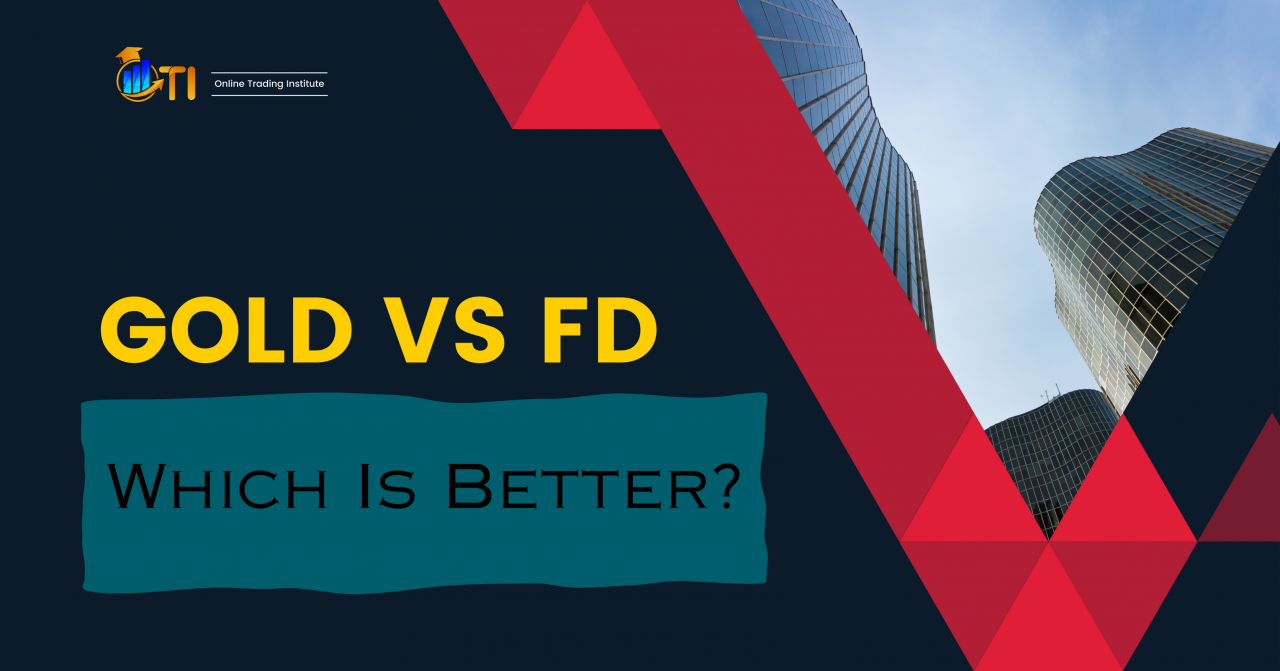Gold vs FD: Which is the Better Low-Risk Investment Option?
There are very few people who want to take risk, many are still afraid of investing in the stock market due to the high risk.
So are there any low-risk investment options? When you talk about the low-risk investment options, two options always stand out, they are Gold and FDs (Fixed Deposit).
Each of these investment options has advantages of its own, so deciding which to go after requires a thorough knowledge of each’s traits and how they fit into your overall financial plan.

Gold Investments
For centuries, gold has been a popular investment due to its timeless appeal. With a balance of security and growth potential, it occupies a special place in the financial market.
Benefits of gold investments:
- Stability amidst Volatility
Gold has traditionally been thought of as a secure investment. The price of gold frequently stays the same or even rises during uncertain economic and market times. Because of this, it is a desirable choice for investors looking for a trustworthy store of value.
- Hedge Against Inflation
The ability of gold to function as an inflation hedge is one of its main benefits. The true worth of gold tends to increase as inflation reduces the value of money. This makes it a useful tool for long-term purchasing power preservation.
- Tangible Asset
Gold is a tangible asset, in contrast to many other investment options. Whether in bullion, coins, or jewellery, investors can hold their gold holdings in physical form. This material element gives one a feeling of safety and control.
Fixed Deposits Investment
Fixed Deposits, which are frequently offered by banks and financial institutions, are a more traditional but dependable form of investment. They offer a fixed return on investment by paying an agreed-upon interest rate over a specified period.
Benefits of investing in fixed deposits:
- Assured Returns
The primary appeal of Fixed Deposits is the certainty of returns. The interest rate is set at the time of investment, ensuring an uninterrupted supply of income. This makes FDs especially appealing to investors who are wary of risk and looking for a consistent source of returns.
- Capital Preservation
FDs are well-known for their capital preservation features. The principal amount invested remains secure and the interest earned contributes to the overall return. This makes FDs an excellent choice for those who value the security of their investment.
- Flexible Tenure Options
Fixed Deposits provide tenure flexibility. Investors can select a tenure which matches their financial objectives, whether short-term or long-term. This flexibility allows a wide range of investment horizons.
Gold vs FD: Key Differences
Now that we know the benefits of investing in both, let’s look at the major key differences between gold and FD.
Liquidity
Gold: Gold is a liquid asset, but converting physical gold into cash may require additional steps. Gold jewellery, for example, may need to be evaluated before being sold.
FD: Fixed Deposits (FDs) provide a high level of liquidity. In case of a financial crisis, the investor may withdraw the investment early, though this may result in a penalty.
Risk Profile
Gold: While gold is generally regarded as a low-risk investment, its value can fluctuate in the short term. However, it has historically shown durability over time.
FD: Fixed Deposits (FDs) are traditionally low-risk investments in which the principal amount is guaranteed. However, fixed returns may not always outperform inflation, thus impacting the real rate of return.
Returns
Gold: Gold returns are influenced by market demand, global economic conditions, and geopolitical events. It has the potential to provide capital appreciation over time.
FD: Fixed Deposits (FDs) provide fixed returns, with interest rates determined at the time of investment. While this provides stability, it may not produce the same return as riskier investments.
Gold vs FD: Which is Better?
The decision between gold and FD is ultimately determined by your personal financial goals, risk tolerance, and preferences. Here are some things to think about when making your decision:
– Risk Tolerance
If you are cautious about risk, FDs may be a better fit due to their guaranteed returns and capital preservation features.
If you can tolerate short-term fluctuations, gold, with its long-term stability, may be a good fit for your risk tolerance.
– Financial Goals
If your primary goal is capital preservation and consistent income, FDs may be a better option.
If you want to diversify your portfolio and protect yourself against economic uncertainty, investing in gold could be beneficial.
– Diversification
Instead of picking one over the other, the right strategy may include investing in both gold and FDs. This diversification can provide stability as well as the opportunity for growth.
Conclusion
Both gold and FDs are low-risk investment options, with unique benefits. Understanding the traits of each investment allows you to personalise your portfolio to meet your long-term financial goals.
Whether you prefer the timeless allure of gold or the security of Fixed Deposits, a well-planned investment strategy will serve as a base for your financial success.
Take the time to consider your goals, risk tolerance, and the need for diversification before making an informed decision that fits with your individual financial journey.
Get access to market news, updates and trends; follow our telegram channel @onlinetradinginstitute
| Disclaimer: The sole purpose of our financial articles is to provide you with educational and informative content. The content in these articles does not intend any investment, financial, legal, tax, or any other advice. It should not be used as a substitute for professional advice or assistance. |






